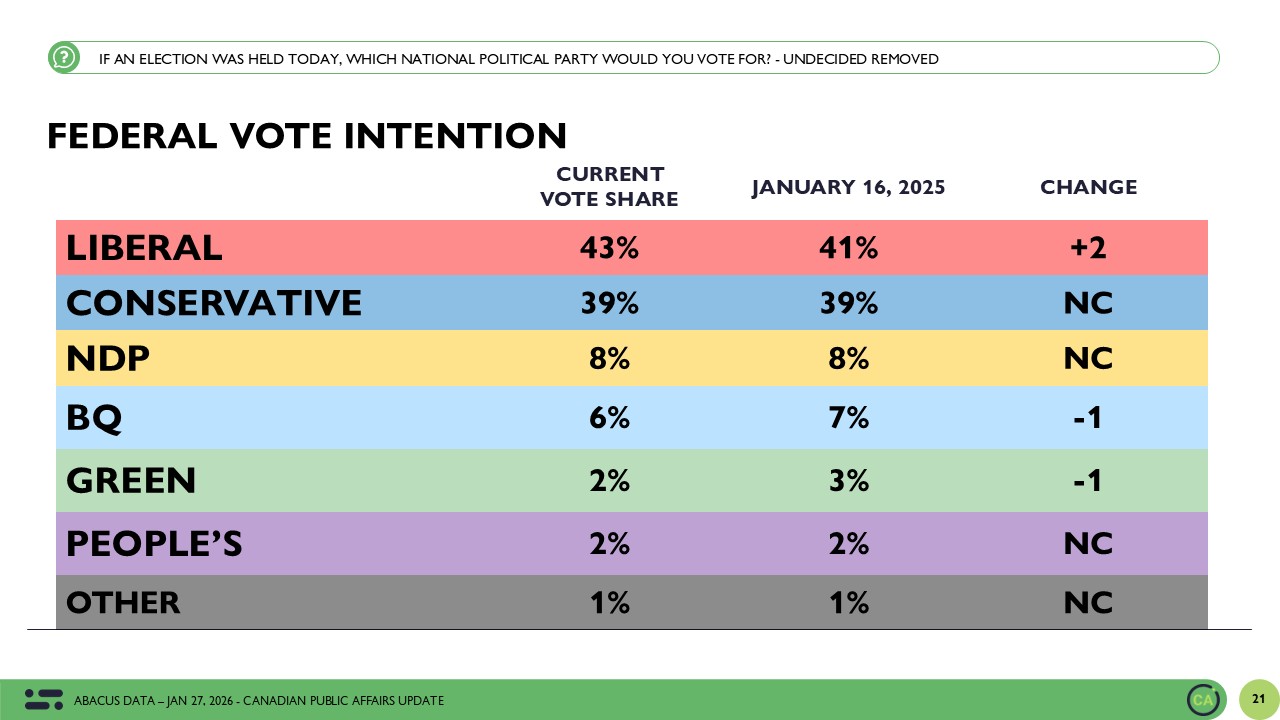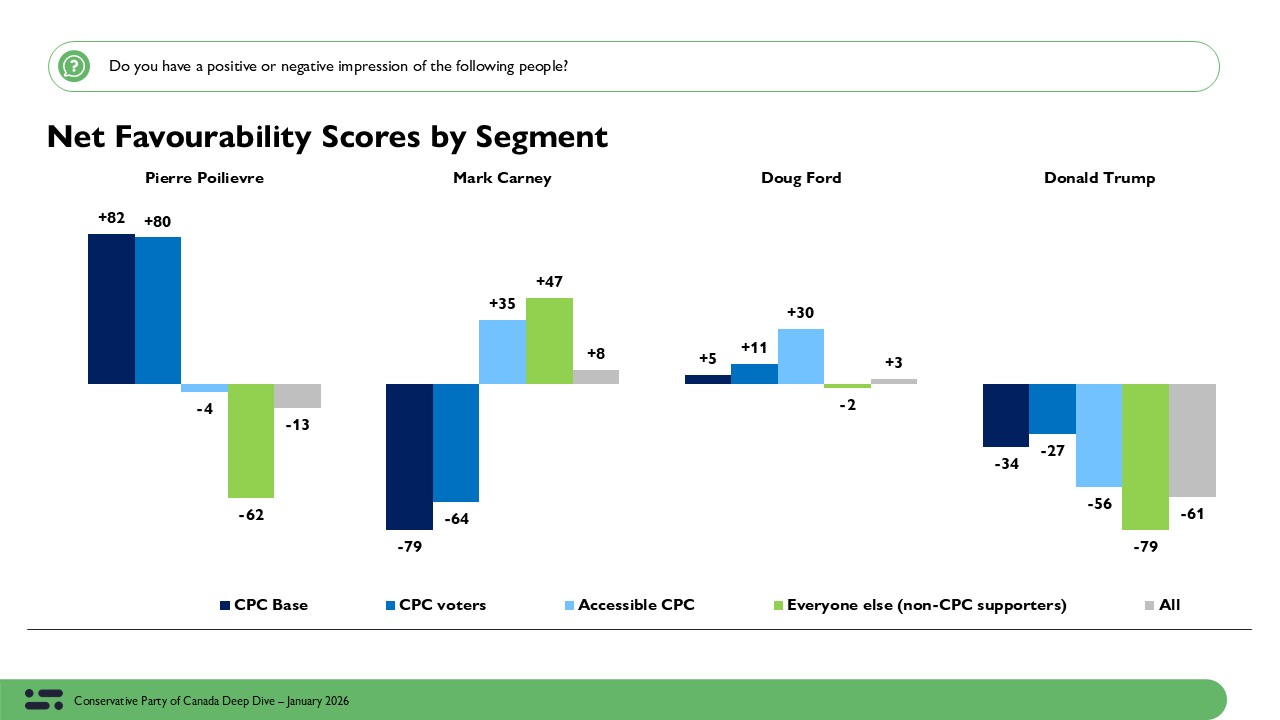Abacus Data Ontario Poll: Ford PCs lead by 16 despite increase in disapproval of the provincial government’s performance
June 30, 2024
From June 20 to June 25, 2024, Abacus Data conducted a survey of 1,000 eligible voters in Ontario exploring several topics as part of our regular national omnibus surveys.
Every month, with our media partner the Toronto Star, we track how Ontarians are feeling about their political choices and add new topics based on current events and discussions. In this edition of the survey, we explore how people feel if Premier Ford called for an early election along with our usual trackers.
Doug Ford’s and Ontario PCs lead by 16-points over Bonnie Crombie’s Ontario Liberals, NDP gain 3 points.
If an election were held today, 41% of committed voters in Ontario would vote PC. The Ontario Liberals are at 25%, with the Ontario NDP closely behind at 22%, and the Greens at 8%.
These results continue to be consistent with previous surveys, including last month’s, and changes are within the margin of error of the survey.
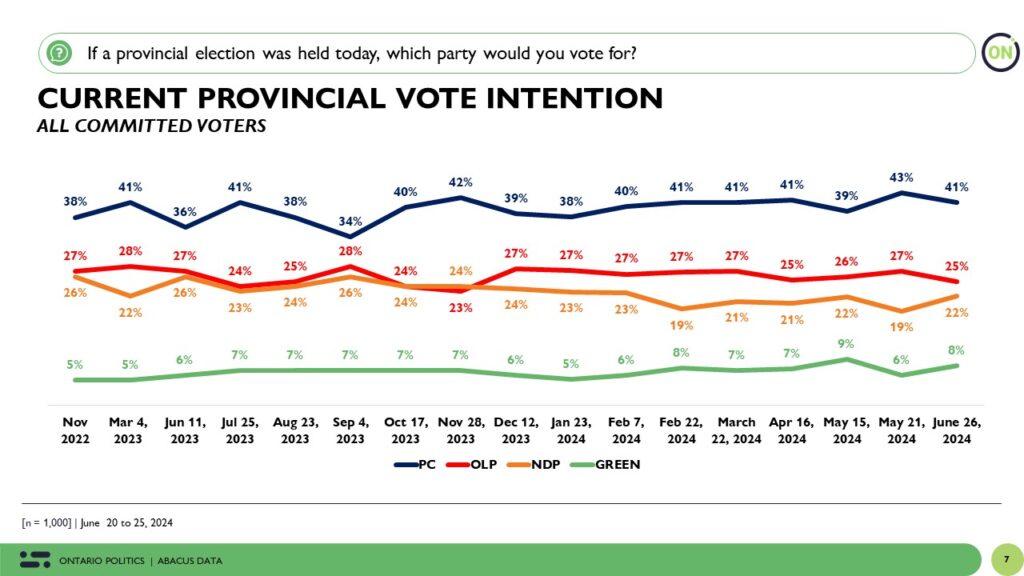
Our data finds a symmetry between federal and provincial voting intentions. Both the Ontario PCs and Liberal vote share in Ontario is slightly lower than their federal cousins. The Ontario NDP vote share is slightly higher than their federal counterpart.
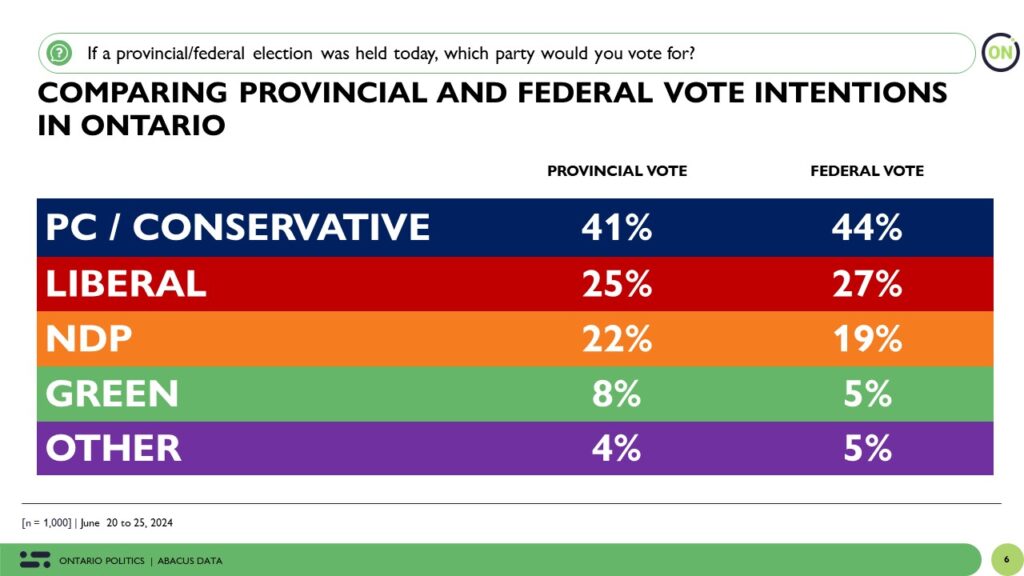
Regionally, the Ontario PCs are also ahead in every region of the province. They lead by 13 points in Toronto, 19 in the GTHA, 21 in southwestern Ontario, and 18 in eastern Ontario.
Importantly, compared to our last survey, the Ontario PCs have gained ground in southwestern Ontario (rising by 7 points) and eastern Ontario (rising by 4 points). For the Ontario Liberals support is slightly down across most regions and 4 points down in the GTHA.
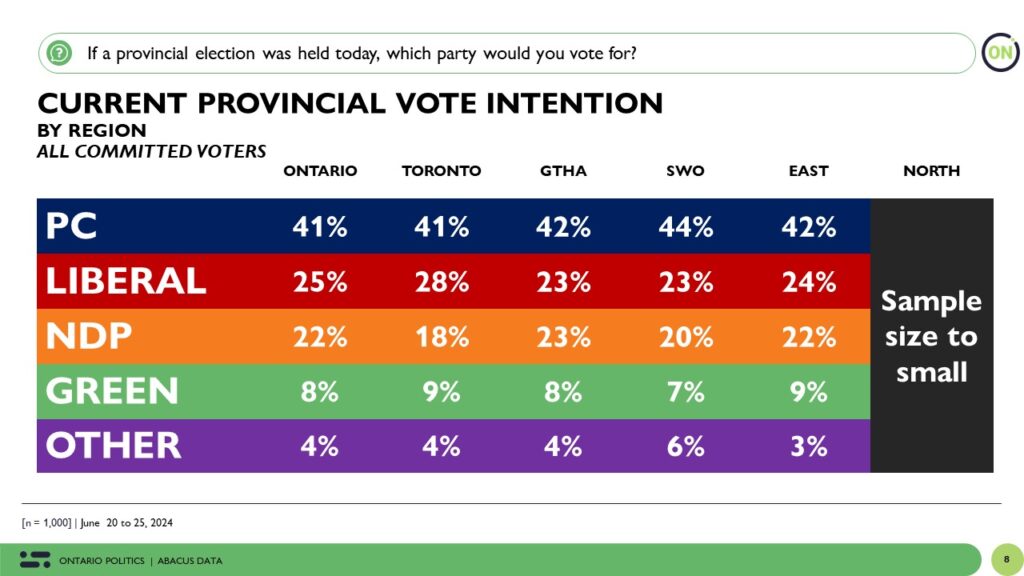
The Ontario PCs also lead in all demographic groups. They are well ahead among men (23-point lead) and among those over 44 years of age. There are two important changes from our last survey.
Last May, among women, the PCs and Liberals were in a tight race. This month, Ontario PCs’ lead the Liberals by 10 points, as support for the PCs increased by 6 points and support for the Liberals decreased by 5 points. Similarly, among those 45 to 59, the PCs are now ahead by 19 points, an increase of 8 points from last month.
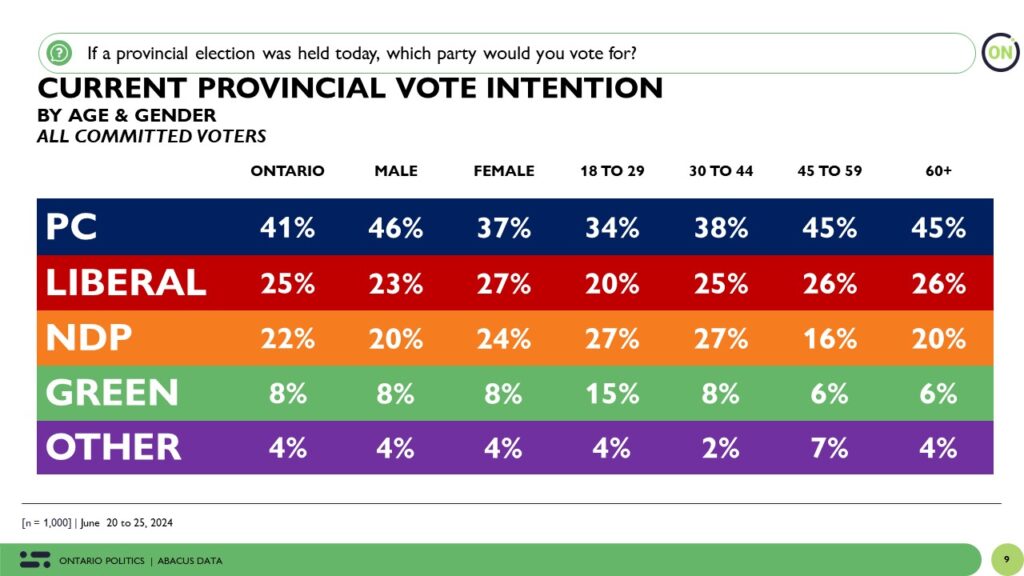
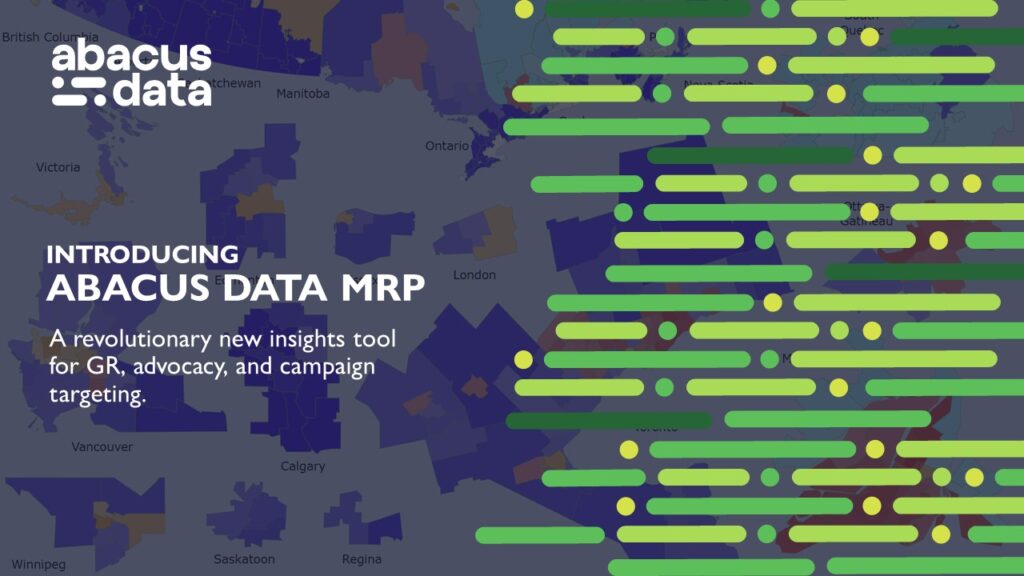
As with vote intention, party leader impressions are largely the same as last month. While 35% have a positive view of Premier Ford (a 4-point increase from last month), he has net score of -10. This represents a 2-point drop since last month, as negatives have increased as well.
In contrast, impressions of NDP leader Marit Stiles and Green Party leader Mike Schreiner are net positive. NDP leader Marit Stiles has a net score of +4 and Green Party leader Mike Schreiner has a net score of +5. Impressions of Ontario Liberal Party leader, Bonnie Crombie, decreased marginally, with a net impression of -2. All in, there has been little change in how Ontarians feel about the party leaders.
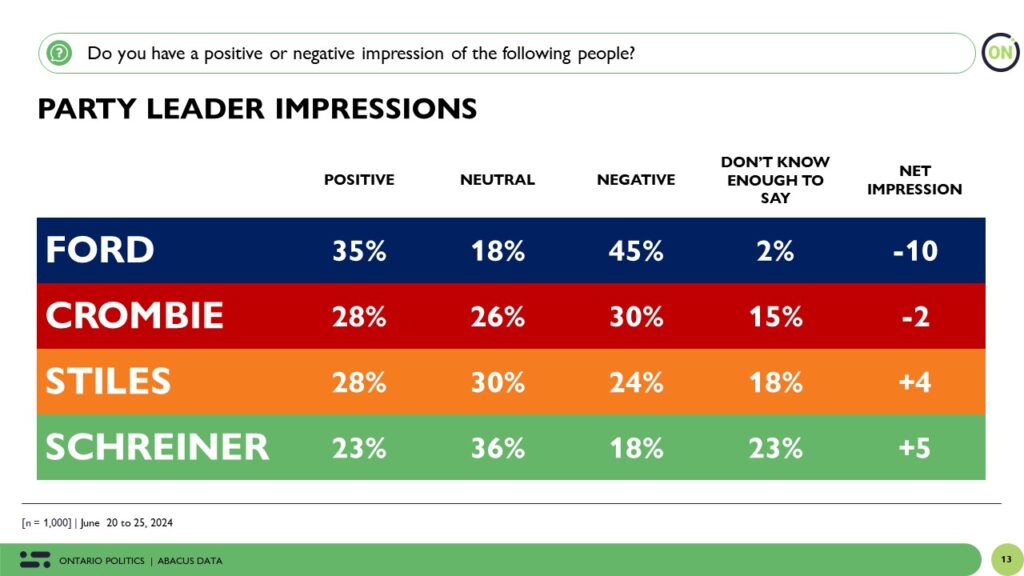
Government Disapproval Jumps 5-Points
Today, 34% of Ontarians say they approve of the job performance of Doug Ford and the provincial government, down 3-points from last month while those disapproving is up to 45%. This is the highest level of disapproval since February but still lower than the 48% we measured at the start of the year.
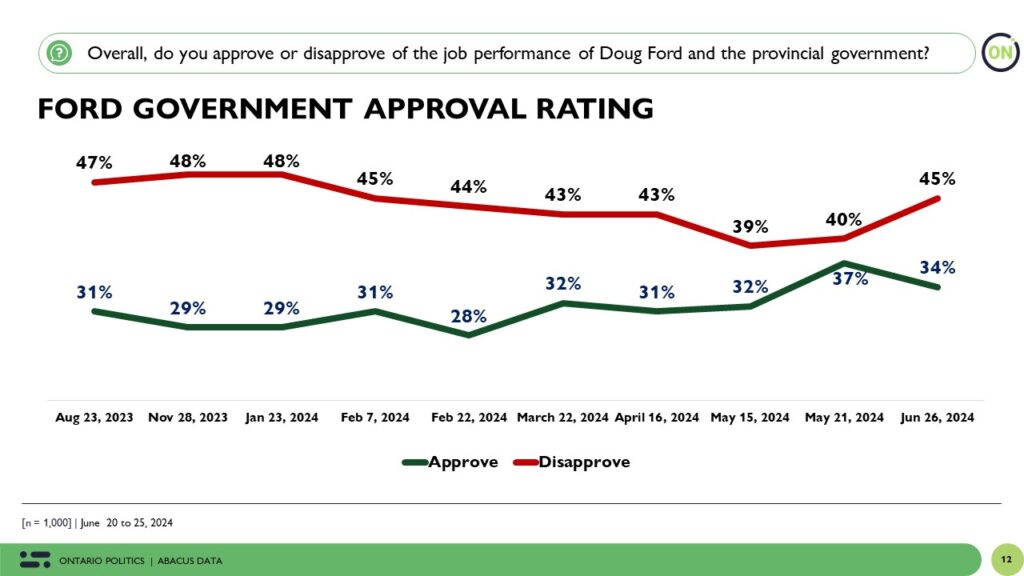

An Early Provincial Election?
Media organizations have reported that the PCs and the Premier are considering calling a provincial election earlier than the scheduled June 2026 timeline.
To assess how the public might react to this, we randomly split our sample and asked people how they would feel if Premier Ford called an early election with three different contexts.
A third of the sample was asked the question without any additional information (let’s call this the control group), a third was shown what an election might cost (experimental group 1), and a third was told that the Premier was calling the election to take advantage of Justin Trudeau’s unpopularity (experimental group 2)
In all three cases, most Ontarians are either happy or unbothered by the prospect of an early election.
When the “control group” was asked their reaction to an early election without any framing, 36% indicated they would be happy with the decision while another 50% said their reaction would be neutral. Only 15% indicated they would be unhappy.
When “experimental group 1” was told that the election would cost $150 million to administer, negative reactions rise to 44% with the rest being either happy (17%) or neutral (39%).
For “experimental group 2”, when told the Premier would call the early election to take advantage of Justin Trudeau’s unpopularity, 20% react negatively, 29% positively, and the remaining 51% have a neutral reaction.
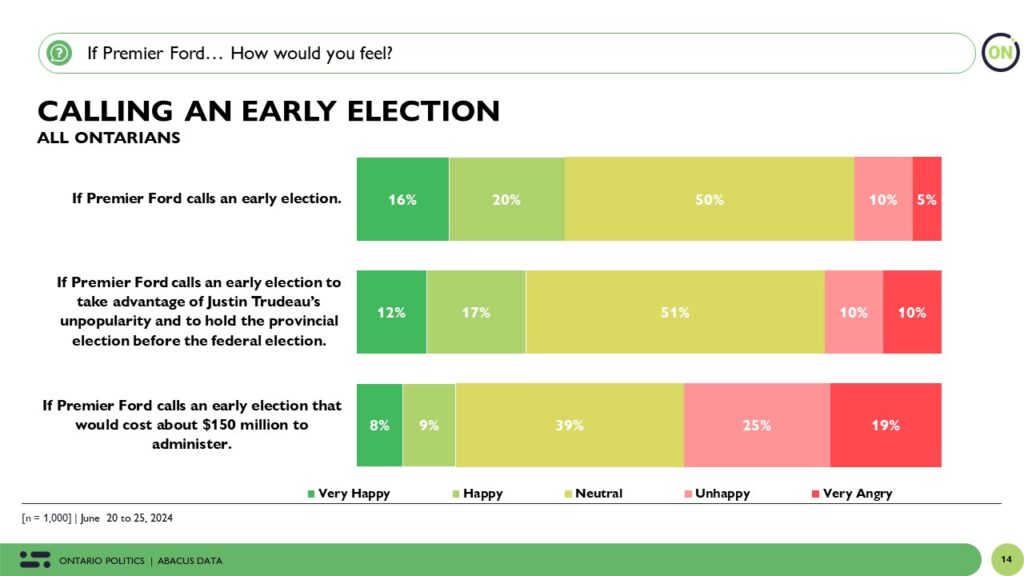
The proportions and dynamics are similar among those who voted PC in 2022. An early election call in which the cost is front and centre creates some friction but not substantially so. 10% of PC voters say they would be very unhappy with an early election when the cost of an election is included in the question.
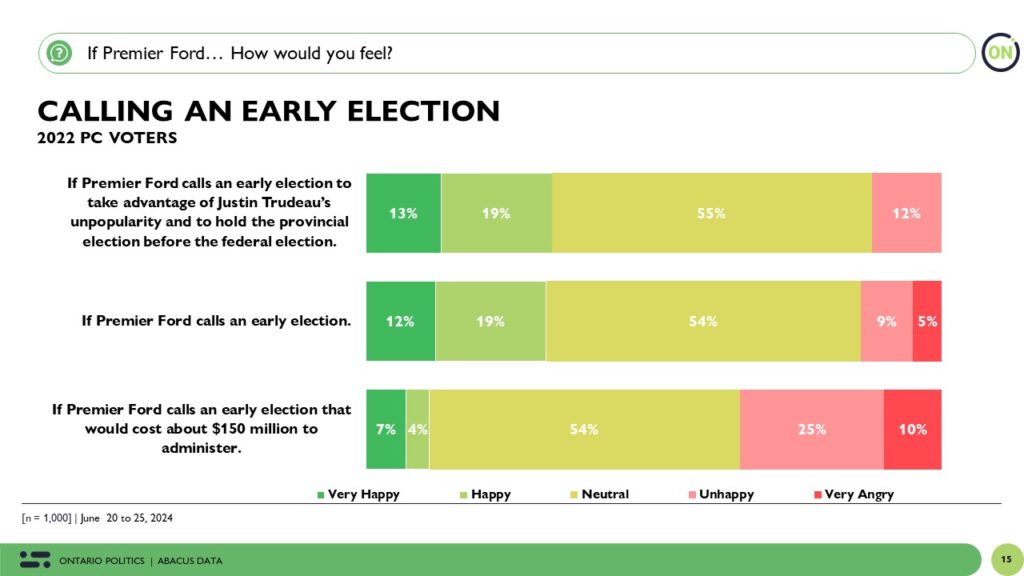
The Upshot
Since our last survey little there have been some changes across the province. While the Ontario PCs continue to lead by a wide margin, the government’s approval has turned more negative. Almost half of Ontarians now disapprove of the government’s performance, a level not seen in our tracking since February.
If an election was held today, the Ford PCs would likely win another majority. The Ontario Liberals under Bonnie Crombie’s leadership have yet to gain any traction while the Ontario NDP has gained a bit more support but still trail in third place. Marit Stiles has a net favourable impression but there are still many Ontarians who don’t know her that well. This is both an opportunity and a threat.
Finally, an early election call is unlikely to create much friction for the provincial government unless the cost is well understood and becomes a lightening rod for discontent.
Methodology
The survey was conducted with 1,000 eligible voters in Ontario from June 20 to 25, 2024.
A random sample of panelists were invited to complete the survey from a set of partner panels based on the Lucid exchange platform. These partners are typically double opt-in survey panels, blended to manage out potential skews in the data from a single source.
The margin of error for a comparable probability-based random sample of the same size is +/- 3.1%, 19 times out of 20.
The data were weighted according to census data to ensure that the sample matched Ontario’s population according to age, gender, educational attainment, and region. Totals may not add up to 100 due to rounding.
This survey was paid for by Abacus Data Inc. Abacus Data follows the CRIC Public Opinion Research Standards and Disclosure Requirements that can be found here: https://canadianresearchinsightscouncil.ca/standards/
ABOUT ABACUS DATA
We are Canada’s most sought-after, influential, and impactful polling and market research firm. We are hired by many of North America’s most respected and influential brands and organizations.
We use the latest technology, sound science, and deep experience to generate top-flight research-based advice to our clients. We offer global research capacity with a strong focus on customer service, attention to detail, and exceptional value.
And we are growing throughout all parts of Canada and the United States and have capacity for new clients who want high quality research insights with enlightened hospitality.
Our record speaks for itself: we were one of the most accurate pollsters conducting research during the 2021 Canadian election following up on our outstanding record in the 2019, 2015, and 2011 federal elections.
Contact us with any questions.
Find out more about how we can help your organization by downloading our corporate profile and service offering.


